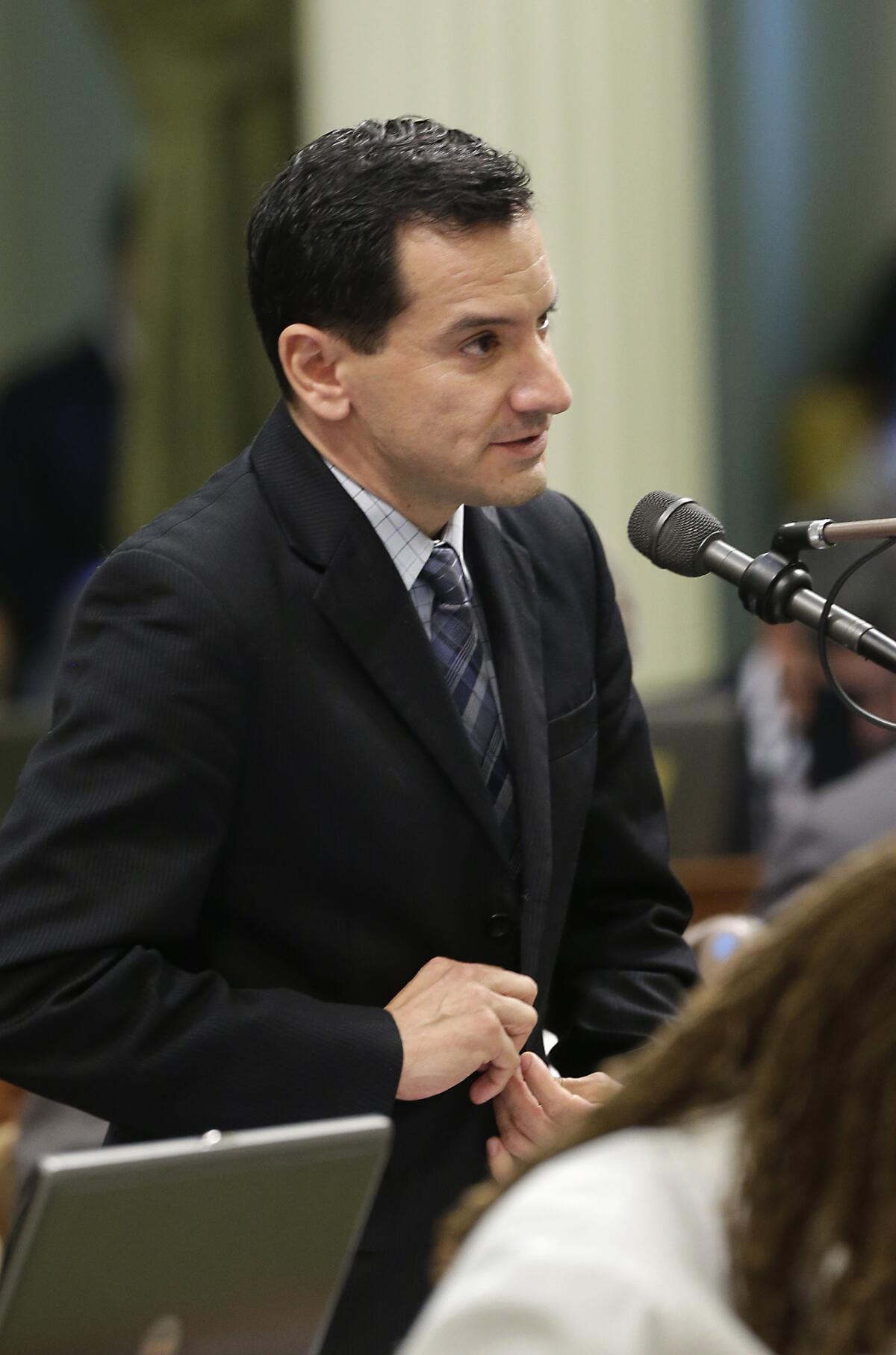Capitol Journal: As next Assembly speaker, academic late-bloomer Anthony Rendon aims to focus on education

Assemblyman Anthony Rendon, D-Lakewood, has been chosen by fellow Democrats to be the next house speaker.
- Share via
Your kid’s doing cruddy in school? Don’t fret. He could rise to the top of his field and land one of the state’s most powerful jobs.
Like Assemblyman Anthony Rendon of Lakewood, who has been chosen by fellow Democrats to be the next house speaker.
But you could have fooled his teachers.
“I was a terrible high school student,” Rendon, 47, told me. “My grade-point at one time was 0.83.”
How, I asked, could it be so low — essentially failing?
“I don’t know that I had tremendous intellectual curiosity back then,” he answers. “I didn’t know a lot of people who went to college. I never thought about it. I wasn’t sure what it was all about.”
Rendon attended California High School in Whittier. His dad labored for a mobile home outfit while also holding part-time jobs. His mom was a teacher’s aide at a Catholic school.
After high school, Rendon worked the graveyard shift loading trucks at a warehouse “for lousy pay,” he says. “People didn’t get treated real well.”
Every morning, he’d ride a bus home that stopped at Cerritos Community College. “Kids were getting off excited while I was tired and falling asleep,” he says.
Why not get off himself, he decided. And the rest is history. After Cerritos, he earned bachelor’s and master’s degrees at Cal State Fullerton, then a doctorate in political science at UC Riverside.
I love that story.
First, here’s a politician who’s not afraid to admit he got crappy grades.
Second, there’s a lesson here: It’s possible to point your life in a better direction with self-motivation and effort.
Third, legislators are supposed to be representative of the people who elect them. Many people barely make it in school. Not everyone is college bound. Democracy works best when lawmakers can relate to all types.
‘’I was a product of California’s low-cost higher education,” Rendon reminds. At least it used to be low-cost. In recent years, tuition has soared. “I don’t know that I would have thought of college as an option today.”
His solution: more state money for universities, but tie it to lower tuition.
Rendon’s No. 1 policy priority, naturally, is education. Specifically, it’s early childhood education. Before he was a politician, Rendon headed a nonprofit child-services organization. He ran for the Assembly, he says, because Sacramento kept chopping childhood development funding.
“We’ve restored less than 20% of what was cut from early childhood education,” he estimates.
Rendon also has an environmental agenda. He once headed the California League of Conservation Voters. He’s especially into “environmental justice” — reducing the impact of unhealthful air and water pollution on working-class communities. It’s a problem his district — including Bell, Maywood and South Gate — shares with the San Joaquin Valley.
Rendon, however, earned his stripes in the Legislature — and support for speaker — by helping to broker last year’s $7.5-billion water bond that passed the Legislature and the electorate overwhelmingly.
As chairman of the Assembly water committee, he held 16 public hearings all over the state, including several in the parched San Joaquin Valley, listening to everyone and upsetting virtually no one.
The compromise provided $2.7 billion for potential dam construction demanded by valley farmers. And it satisfied environmentalists by not helping Gov. Jerry Brown build his proposed costly, colossal twin tunnels under the Sacramento-San Joaquin River Delta.
“These large conveyance projects — tunnels included — are exceptionally expensive,” Rendon says. “We get a bigger bang for the buck from local projects.”
Rendon leans left. “We need to be focused on poverty and income inequality,” he asserts.
He supports Brown’s $68-billion bullet train obsession. He also advocates extending the governor’s soak-the-rich temporary tax hike when it expires in 2018.
But he earned the trust of influential moderate Democrats — and many of their votes for speaker — with his evenhandedness on the water bond.
How much his views on issues will matter once he becomes speaker — in February or March — is an open question. It depends on whether he chooses to lead, or can. Legendary Speaker Willie Brown famously said the job was like trying to herd cats.
Rendon is very likable — gregarious but not a showboat.
First elected in 2012, he ran for speaker last year and lost to Assemblywoman Toni Atkins (D-San Diego). But she’s termed out next year and has been preparing to run against Democratic Sen. Marty Block of San Diego. That raised eyebrows. Legislators want leaders who can help them get reelected, not be focused on their own race.
If not herded, cats can eat a lame duck alive. Just before the legislative session ended, Democrats began tossing Atkins aside and anointed Rendon.
Because a new term-limits law will allow him to be an assemblyman for 12 years, there has been speculation that Rendon could hold the top job through 2024. Don’t bet on it. Only four speakers in history have lasted more than five years.
Lawmakers get antsy to move up the ladder and throw leaders off their perch. Retaining power requires skillful compromising combined with meaningful rewards and punishment — dexterity honed only on the job.
Meanwhile, symptomatic of California’s changing demography, both legislative houses for the first time will be led by Latinos.
Senate leader Kevin de León (D-Los Angeles) was raised in poverty by an immigrant house cleaner with a third-grade education. Rendon’s grandparents were Mexican immigrants. Their grandson nearly flunked school.
It’s a nice America Dream story in California’s Capitol.
Twitter: @LATimesSkelton
More to Read
Sign up for Essential California
The most important California stories and recommendations in your inbox every morning.
You may occasionally receive promotional content from the Los Angeles Times.











